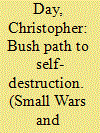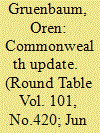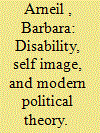| Srl | Item |
| 1 |
ID:
142609


|
|
|
|
|
| Summary/Abstract |
This article explains the demise of Sierra Leone's Revolutionary United Front (RUF) rebellion. It argues that the main cause of this fate was the group's relationship with its primary sponsor, Charles Taylor. The RUF's dependency on Taylor's patronage, coupled with the rebellion's weak organisational endowments harmed the group's prospects of success. Based on original research, the article shows how Taylor used the RUF as a strategic instrument for his own regional interests, which led to the group's unravelling. More broadly, the article speaks about proxy warfare in Africa and how the relationship between resource flows and rebellion are not always beneficial to rebels as one might expect.
|
|
|
|
|
|
|
|
|
|
|
|
|
|
|
|
| 2 |
ID:
114191


|
|
|
|
|
| Publication |
2012.
|
| Summary/Abstract |
There was little progress in negotiations over the disputed ousting of former president Mohamed Nasheed in the Maldives. In a landmark ruling, the former Liberian president Charles Taylor was found guilty of aiding war crimes and crimes against humanity in Sierra Leone's civil war. Malawi's vice-president Joyce Banda succeeded President Bingu wa Mutharika despite an apparent coup attempt by the brother and ministers of the late Mutharika. There were hopes of a 'Malaysian spring' as record numbers of protesters took to the streets. Pakistan's supreme court found the prime minister, Yousaf Raza Gilani, guilty of contempt of court. The kingdom of Barotseland declared it was seeking to secede peacefully from Zambia.
|
|
|
|
|
|
|
|
|
|
|
|
|
|
|
|
| 3 |
ID:
087435


|
|
|
|
|
| Publication |
2009.
|
| Summary/Abstract |
Charles Taylor argues that recognition begins with the politics of "self-image," as groups represented in the past by others in ways harmful to their own identity replace negative historical self-images with positive ones of their own making. Given the centrality of "self image" to his politics of recognition, it is striking that Taylor, himself, represents disabled people in language that is both limiting and depreciating. The author argues such negative self-images are not unique to Taylor but endemic to modern political thought from John Locke to John Rawls, as the disabled ("irrational" and/or mentally disabled/ill people) are constituted in direct opposition to the rational person and/or citizen. Using contemporary social theories of disability, as articulated by disabled scholars and advocates, the author concludes that such negative self-images (and the binary of autonomy/justice and dependency/charity underpinning them) must be purged from political theory and replaced with an alternative theory of personhood/citizenship rooted in the image of interdependency.
|
|
|
|
|
|
|
|
|
|
|
|
|
|
|
|
| 4 |
ID:
121885


|
|
|
|
|
| Publication |
2013.
|
| Summary/Abstract |
This article critically engages with recent theoretical writing on the anthropology of secularism by way of studying the perceptions and consciousness of those whom I name 'militant laic actors' in Turkey. Beginning with their key conviction that the present Government of the Justice and Development Party (AKP) possesses a hidden mission to Islamize the country, I argue that rather than relating to the actual policies of the AKP, such a conviction reflects the mood and emotions of laic actors. This perception is not without a social context. It relates to both the enlarged political power of the AKP and to the relative thwarting of social agency experienced by militant laic actors. The paper concludes by noting certain insufficiencies in both Charles Taylor's and Talal Asad's work as frameworks for explaining the dynamics of secularism while making a case for the significance of the Turkish situation in contributing to wider debates in the anthropology of secularism.
|
|
|
|
|
|
|
|
|
|
|
|
|
|
|
|